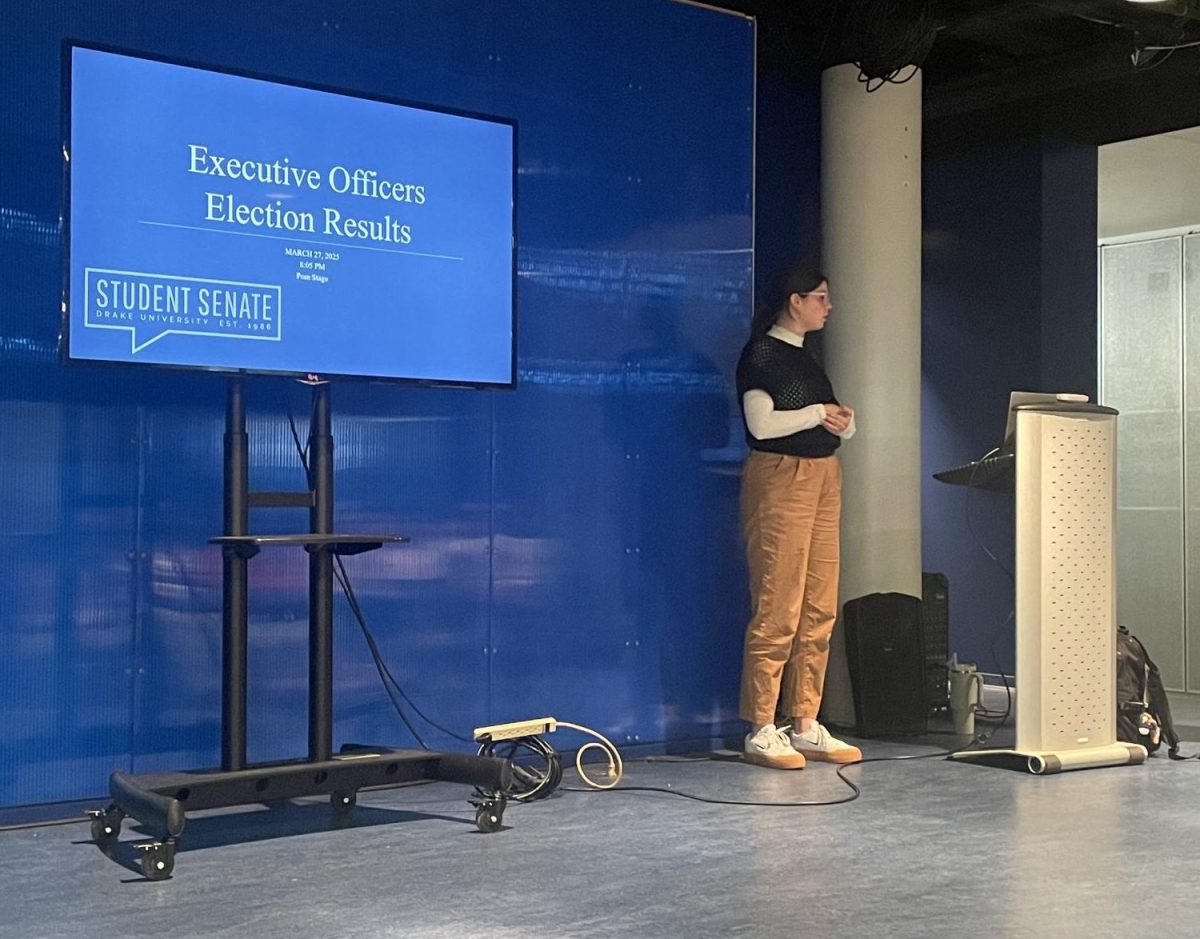A new proposal, written by Vice President of Student Organizations Ian Klein, Student Body Treasurer Jacob Salazar and Student Body President Adam Koch, seeks to decrease the Board of Student Communications budget by nearly 20 percent annually. This would cut roughly one-fifth of the funding available to student-run media organizations, including Drake Magazine, Drake Broadcasting Systems, DUiN, the Times-Delphic, Drake Political Review, and Periphery, and redistribute those funds to other Registered Student Organizations. However, a key portion of the financial data contained in the initial proposal is inaccurate.
According to the proposal, which was shared with the Board of Student Communications on Monday, Feb. 15, the current BSC budget is funded by a Media Fee currently set at $37.75 per student. This rate was implemented in 2019 and is set to be reevaluated in 2023, resulting in a total budget of $126,073 for the BSC this academic year. The proposal then explains that the media fee is lumped into an annual Student Activities Fee that is incorrectly identified as $91. The Student Activities Fee is currently $178 annually or $89 per semester. The proposal recommends cutting $7 from each student Media Fee, redistributing roughly $22,000 from the BSC budget to other Registered Student Organizations.
This extra $22,000 would not be the first budget increase non-media RSOs have received recently. Student Activity Fees increased by $32 this year, bringing the previous annual charge of $146 up to $178. That’s a total increase of over 20 percent. However, because the BSC budget remained static at $37.75, the BSC did not benefit from this increased Student Activity Fee. As a result, the change has already increased the funds available to non-BSC organizations by nearly 30 percent this year.
Other information included in the proposal were numbers detailing the salaries of seven members of the student senate, including student body president, vice president of student life, vice president of student activities, vice president of student organizations, student body treasurer and the co-presidents of the UNITY Round Table. These seven positions make a combined total of $33,000, whereas the $56,347 allotted to salaries in the BSC budget is typically paid out to more than 100 students.
While initially disappointed to hear about the proposed cuts, senior Emilyn Crabbe, Editor-in-Chief of the Drake Political Review, was hopeful that the changes might serve a greater purpose.
“I thought, that’s a lot of money that we get, and I don’t know what it takes to run the entire university’s budget, so I wanted to give them the benefit of the doubt,” Crabbe said. “But as I read on there was a lot in the proposal that felt half-baked.”
Crabbe grew more frustrated with the proposal after noticing inaccuracies in the data.
“I think it’s just appalling that this massive budget cut, nearly a 20 percent reduction in the BSC’s budget, is getting proposed on the basis of such inaccurate and incomplete information,” Crabbe said. “This proposal demonstrates a lack of thoroughness that is really disappointing.”
Crabbe said “the most jarring and confusing part” of the proposal was the implication that student employees working less than five hours per week should not be paid.
“They justify this argument by saying that there are students who will put five hours of work a week into other student organizations without getting paid, which to me feels very dismissive of the professional development opportunities afforded to students working for one of the university’s student publications,” Crabbe said. “We put these on our resumes as real work experiences. A member of a special interest organization like the chess club or a recreational organization like the running club, to offer a few examples, are simply not developing professionally in the same way that an assistant print editor for Drake Mag is.”
Crabbe is not alone in her concerns. SJMC Senator and BSC Co-Chair Carson Reichardt emphasized the impact a few hours of paid work can have on a college student.
“As a former student employee working for one of the publications, I can’t justify removing student pay, especially when they’re creating materials that are actively utilized by the university. In my mind, it’s the same as students being paid for a desk shift, a shift at the Bell Center, or any other campus job,” Reichardt said. “Being paid for just a few hours a week may not seem like much to an outsider, but for a lot of students it can be really significant, myself included. I want the BSC to be able to live up to its promise of providing opportunities for all students, and these cuts would make it more difficult for us to do that.”
When asked for comment, Student Body Treasurer Jacob Salazar sent a statement co-authored by Koch and Klein that further explained the motivations behind the proposal.
“There are 6 Drake publications that are student organizations, and together they are a part of the Board of Student Communications (BSC). Unlike the other 130+ student organizations at Drake, these 6 student organizations automatically get a proportion of the Student Activity Fee,” the statement said. “These 6 student organizations do not go through the same rigorous annual process of requesting a budget as all other student organizations do…[and] have not had their budget cut in years. The mechanisms of accountability for their budget is a “review” that takes place every five years; however, in order to change the BSC budget, 2 out of 3 governing bodies–the Student Senate, the Faculty Senate, and the BSC themselves–have to approve the change. Clearly, this high bar has made it nearly impossible to change the budget of the BSC or try and hold those 6 student organizations to standards even nearing those set for the other 130+ student organizations at Drake. These 6 student organizations do not play by the same rules.”
Associate Professor of Journalism and BSC Co-Chair Jeff Inman said that the BSC budget review system was designed this way for a reason.
“The BSC was intentionally organized as the only joint student/faculty committee on campus so that neither Student Senate nor Faculty Senate could have any undue influence on the student media that diligently covers both,” Inman said. “I appreciate Student Senate’s wish to oversee the six publications budgets, but to give them that control would allow them to defund a publication whose coverage they don’t agree with, and Drake University has had a long history of fair and accurate coverage of student government on campus. Any attempt to attack or defund that coverage is a disservice to all students on campus, who rely on student media for entertainment, information, and advocacy in holding student and faculty government, as well as the university administration, to account.”
Inman also explained that the BSC budget has been reduced by $21,000 since 2015, which directly contradicts the statement’s assertion that the organizations funded by the BSC “have not had their budget cut in years.”
For this proposal to take effect, it must be approved by two out of the three governing bodies on-campus–Student Senate, Faculty Senate, and the Board of Student Communications. The timeline for this is dependent on a variety of factors, including acceptance of motions submitted to the aforementioned governing bodies.
Students concerned about the proposal are not without recourse.
“If you have any concerns about this proposal that you’d like to bring to the senate, please feel free to reach out to me directly at carson.reichardt@drake.edu,” Reichardt said. “My job is to help make sure that students feel like their concerns are being represented at senate, and I want to do that to the best of my ability.”









